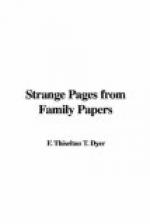In course of time the father died, and William, the elder son, succeeded to the property, dying unmarried in May, 1802. As nothing was heard of Nicholas, the two sisters became entitled to the property, of which they held possession for twenty years, no claim being made to disturb their possession of it.
But in the year 1783, a young man, whose looks and manners were above his means and situation, had made his appearance as a stranger at Liverpool, going by the name of Nathaniel Richardson—the same initials as Nicholas Robinson. He bought a cab and horse, and plied for hire in the streets of Liverpool—and being “a civil, sober, and prudent man,” he soon became prosperous, and drove a coach between London and Liverpool. He married, had children, and gradually acquired considerable wealth. Having gone to Wales, however, in the year 1802, to purchase some horses, he was accidentally drowned in the Mersey. Many years after his death, it was rumoured in 1821 that this Nathaniel Richardson was no other than Nicholas Robinson, and his eldest son claimed the property, which was then inherited by the two daughters. An action was accordingly tried in Cornwall to recover the property. The strange part of the proceedings was that nearly forty years had elapsed since anyone had seen Nicholas Robinson; but, says Sir John Coleridge, “It was made out conclusively, in a most remarkable way, and by a variety of small circumstances, all pointing to one conclusion, that Nathaniel Richardson was the identical Nicholas Robinson”. The Cornish and Liverpool witnesses agreed in the description of his person, his height, the colour of his hair, his general appearance, and, more particularly, it was mentioned that he had a peculiar habit of biting his nails, and that he had a great fondness for horses.
In addition to other circumstances, there was this remarkable one—that Nathaniel’s widow married again and that the furniture and effects were taken to the second husband’s house. Among the articles, was an old trunk, which she had never seen opened; but, on its contents being examined one day, among other letters and papers, were found the two certificates of Nicholas Robinson’s admission as Attorney to the Courts of Queen’s Bench and Common Pleas—and, on the trial, the old master of Nicholas Robinson, alias Nathaniel Richardson, swore to his handwriting, and so the property was discovered.
It has been often remarked that London is about the only place in all Europe where a man, if so desirous, can disappear and live for years unknown in some secure retreat. About the year 1706, a certain Mr. Howe, after he had been married some seven or eight years, rose early one morning, and informed his wife that he was obliged to go to the Tower on special business, and at about noon the same day he sent a note to his wife informing her that business summoned him to Holland, where he would probably have to remain three weeks or a month. But from that day he was absent from his home for seventeen years, during which time his wife neither heard from him, nor of him.




